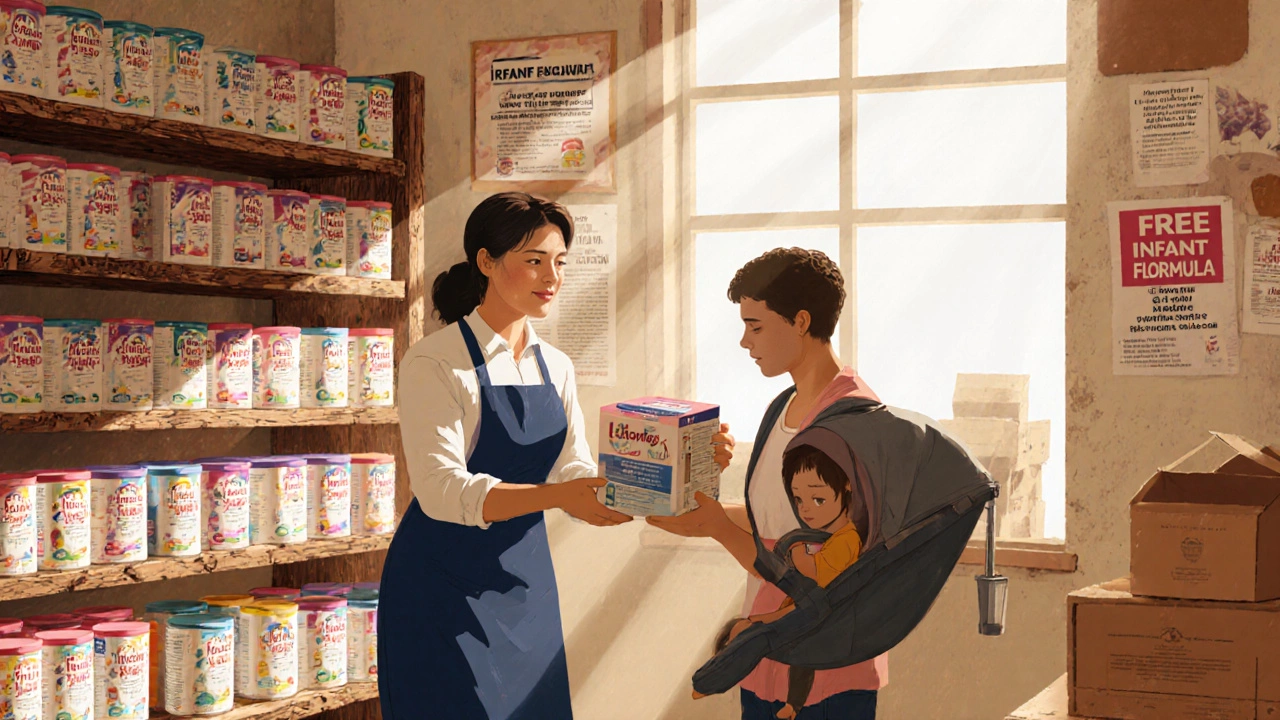How to Get Free Baby Formula When Money’s Tight - A Practical Guide

Free Baby Formula Eligibility Checker
Find Your Free Formula Options
Answer a few quick questions to see which programs you qualify for. This tool uses the latest Canadian assistance programs from the article.
When you’re staring at an empty formula canister and a tight budget, Baby formula assistance is a service that connects families with free or low‑cost infant formula through government programs, charities, and community resources. Below is a step‑by‑step plan that turns panic into a clear path forward.
Understand Your Immediate Options
The fastest way to put formula back on the shelf is to tap into emergency resources that don’t require a lengthy application. Three places almost always have stock:
- Food Banks often keep a small inventory of infant formula that can be taken home the same day.
- Hospital Social Workers can arrange a one‑time formula drop‑off for discharged patients or for families who walk in.
- Local Community Charities such as religious groups or parent‑support nonprofits usually run formula drives.
Call ahead, mention you need free baby formula, and ask about current stock. Most locations will reserve a few cans for you while you arrange transport.
Apply for Government Assistance Programs
If you need regular supplies, government programs provide the most reliable, long‑term safety net. Below is a quick comparison of the main options available across Canada.
| Program | Eligibility | Coverage | How to Apply | Contact |
|---|---|---|---|---|
| WIC program | Low‑income families; income ≤ 185 % of the federal poverty line | Up to 12 months of formula (any brand) plus nutrition counseling | Visit a local WIC clinic or call the provincial helpline | 1‑800‑WIC‑CANADA |
| Provincial Infant Formula Program | Residents of BC, Ontario, Alberta with documented financial hardship | Monthly allotment of 2 quarts per infant, renewable annually | Complete an online application; upload pay‑stub or benefit statement | provincial.health.gov/formula |
| Canada Child Benefit (CCB) supplement | All families receiving CCB; additional low‑income tier | Extra $50 monthly earmarked for infant nutrition | Automatic; no extra paperwork needed | Service Canada - 1‑800‑CAR‑HELP |
| Hospital Social Workers | Any family with a newborn admitted to a participating hospital | One‑time formula kit (up to 4 quarts) plus referral to community services | Ask at the reception desk for a social‑work consult | Hospital main line - extension 223 |
Start with the program that matches your province. Most people qualify for at least one, and the applications are free.
Connect with Local Charities and Support Networks
Beyond the big programs, neighbourhood groups often fill the gaps. Here are three proven ways to locate them:
- Search the city’s official Vancouver Community Services directory for "infant nutrition" or "baby formula". The list includes churches, food co‑ops, and parent‑run groups.
- Join a local parenting Facebook group. Members routinely post "formula drive" alerts and can arrange pickups.
- Contact a Lactation Consultant at your nearest health centre. Many offer a “donate‑unused‑formula” collection service.
When you reach out, be clear about the infant’s age and any brand preferences-some programs only carry hypoallergenic formulas.

Stretch What You Have Until Help Arrives
If there’s a short wait for official assistance, small adjustments can keep your baby nourished:
- Mix with breast milk if you’re pumping. Diluting formula with a little breast milk extends each bottle without compromising nutrition.
- Store opened cans in the fridge (max 48 hours) instead of discarding leftovers.
- Use a measured scoop every time. A common mistake is adding extra powder, which shortens supply dramatically.
- Consider a half‑strength formula for infants over six months if pediatrician approves.
These tactics buy you time without risking your baby’s health.
Plan for Long‑Term Financial Stability
While emergency aid solves the immediate crisis, building a buffer protects against future shortfalls. Here are three actions that pay off quickly:
- Enroll in the Canada Child Benefit (CCB) supplement if you haven’t already. The extra $50 per month can be earmarked for formula purchases.
- Apply for the provincial Provincial Infant Formula Program and set up automatic monthly deliveries through the program’s partner pharmacies.
- Build a “nutrition emergency fund” of $100-$200 when possible. Even a small cushion prevents you from scrambling each month.
Financial planners at community centres often offer free budgeting workshops-take advantage of them.
Know Your Rights and Advocate When Needed
In Canada, all families have the right to adequate nutrition for their children. If you encounter barriers-long wait times, denial of benefits, or discriminatory treatment-consider these steps:
- Document every interaction (date, name, outcome). This record strengthens any appeal.
- Contact the provincial health ombudsman. They can investigate service failures.
- Reach out to a local legal aid clinic. Many offer pro‑bono advice on benefits disputes.
Advocacy not only helps you but also improves the system for other families.
Quick Reference Checklist
- Call your nearest Food Bank today - ask for infant formula.
- Complete the WIC program application online or in‑person.
- Register for the Provincial Infant Formula Program if you reside in BC, ON, or AB.
- Reach out to a local Lactation Consultant for formula‑donation links.
- Set up a $50 monthly earmark in your Canada Child Benefit.
Can I get baby formula if I’m not on any government assistance?
Yes. Many food banks, community charities, and hospital social workers provide formula regardless of income. They only need proof of the infant’s age.
How long does it take to receive formula after applying to a provincial program?
Processing usually takes 2-4 weeks. Once approved, you receive a monthly allotment delivered to your chosen pharmacy or pick‑up location.
What brands are covered by the WIC program?
WIC contracts with several major brands (e.g., Similac, Enfamil, and Gerber). You can request a specific brand if it’s stocked at your local WIC clinic.
Can I combine multiple assistance sources?
Absolutely. Families often use a mix of government programs, food banks, and charity drives to ensure a steady supply.
What should I do if a program refuses my application?
Request a written explanation, then appeal through the program’s grievance process. If needed, seek help from legal aid or a community advocate.